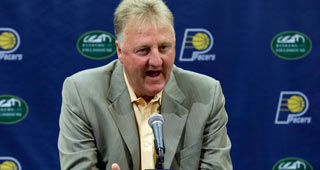Imagine a fledgling Fortune 500 company at a crossroads, unsure whether they should make a major operational change or enter into a high-stakes merger. Do they cast off valuable employees for younger ones in search of a better bottom line? Should they close factories and eliminate jobs with an eye on the future and better competitive climate?
The future of that company lies at the hands of one person -- the man or woman with the title of president.
Now envision that executive, staring at a small window in which to make a definitive decision on the company’s future, simply walking away.
Stockholders and competitors would stare mouths agape. Michael Lewis and Jim Cramer would eviscerate him. Employees, already unsure of what the future held, would realize quickly that an already questionable situation has become more unpredictable.
The Indiana Pacers may not be a multinational corporation, but they have just experienced that hypothetical as a reality.
Larry Bird’s decision to step down as president of basketball operations comes at a crucial time for the franchise with Paul George’s future in serious question. Bird drafted George with the tenth overall pick in 2010, built the roster that went toe-to-toe with LeBron James and the Miami Heat in three straight postseasons and oversaw the most important exit interview in team history after they were swept by the Cleveland Cavaliers in four close games.
Several players were told during those exit interviews that Bird was considering stepping down, Nate Taylor of the Indy Star reported, and you’d assume George was one of those players. There will be some continuity with Kevin Pritchard moving up as the lead decision-maker, but the direction the team takes with Pritchard at the helm could be vastly different than it whatever course Bird had planned. George met with the Bird-led front office on a few occasions recently and now will have to be reassured that Pritchard will follow the same path or be sold on new ideals.
This is not the first time Bird has unceremoniously stepped down. He retired in 2012 as the Pacers were emerging as a contender, only to return to his post a year later, but this departure carries much more weight because of what is at stake. If George can’t be convinced to sign a long-term contract, the Pacers face the possibility of becoming a bottom-five club. Bird has maintained that the Pacers aren’t in a position to undergo a full-scale rebuild, but they won’t have a choice if George leaves.
The only assets they have right now are Myles Turner and their draft picks. This year’s draft class is lauded as deep, but the Pacers will be lucky to select a player that can start in the near future, let alone become a star, with the 18th pick. Moving George soon would yield a high selection, but unless they are able to acquire someone like Markelle Fultz or Lonzo Ball (or even if they do) the growing pains could still see the Pacers well out of the playoff picture in 2018.
Danger also resides in the fact that Bird won’t be completely divorced from the franchise. If he remains on as a consultant, as The Vertical report suggested, his influence would still loom large. There may not be a more powerful consultant in professional sports. What would keep him from stepping back into a more prominent role if he gets the itch a few months or years down the line?
Pritchard has the opportunity to put his fingerprints on a newly constructed roster and is more than capable, but has also been put in an unenviable position. If George has no plans to re-sign, Pritchard will be the one that will be forced to trade him. It’ll become his transaction rather than Bird’s, who made the decisions that brought the franchise to this point.
He built a strong roster as general manager with Portland that remains a romantic what-if in the minds of NBA fans – how far could they have gone if Brandon Roy and Greg Oden were blessed with health?
In reality, the Pacers might be in better hands with Pritchard -- that remains to be seen. With Bird’s reluctance to bottom out, you could foresee a situation where George is traded, but Jeff Teague is re-signed and veterans are brought in to keep the team competitive. That would only stunt the growth of a potential high draft pick and keep them on the mediocrity treadmill. Of all the paths the Pacers could take, this would be the most frustrating.
Regardless of whether or not George leaves and how a rebuild is approached, Bird's sudden absence in that process will be notable, and added to the instability surrounding the Pacers in 2017.



